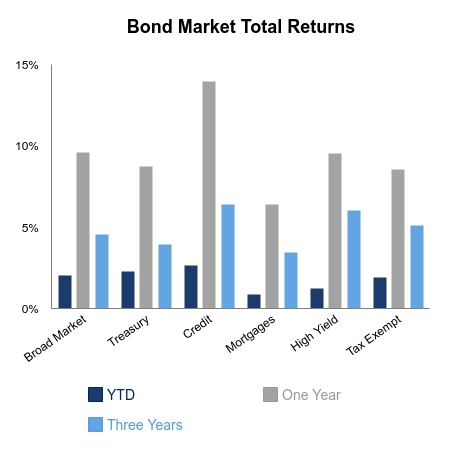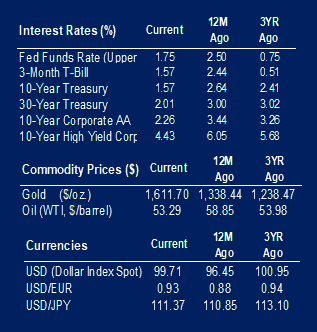The impact of the Coronavirus on the U.S equity markets was somewhat muted this week. The S&P 500 saw a gain of 0.40%. A contributing factor to the gain is better than expected earnings reports from U.S companies. With a little over 80% of companies reporting, earnings growth has been 5.1% better than expected at 3.9%. Sales growth has been in-line with expectations at 4.1%. This is a positive surprise of 1%. The growth in earnings has been led by the Utilities sector with growth of 15.9% and the Financial sector with growth of 12.4%. Growth in sales has been led by the Financial and Healthcare sectors at 15.8% and 12.7%. Energy continues to be a drag not just on performance, but on growth too. Earnings for the sector have declined by 40.8%. Sales are down 6.6%.
Headline Consumer Price Index (CPI) numbers for January came in better than expected this week. Economists expected a year-over-year reading of 2.4%, and they got 2.5%. The reading compares to the Federal Reserve’s preferred measure of inflation, Personal Consumption Expenditure (PCE), year-over-year reading of 1.6% for December. The January CPI reading is the biggest gain since October 2018. The growth was led by increases in fuel costs. Energy pricing grew by 6.2% over a year ago. Excluding food and energy, CPI grew by 2.3%. Month-over-month, CPI grew by 0.10%. This is lighter than the expected 0.20%. Low energy prices for the month contributed to the lower than expected number. Excluding energy and food, CPI was up 0.2% over the month. Increases in the price of rent, clothing and airline tickets contributed to the number.
Retail sales grew by 0.30% in January. This is in-line with expectations but lighter than the average January numbers. Clothing store sales were a drag on the sales number. Those sales declined by 3.1%. The biggest growth contributors were building materials and garden equipment stores like Home Depot. Sales in the segment grew by 2.1%.
Business Inventories stayed flat in December with growth of 0.10%. The consensus expectation was for growth of 0.10%.
The masses are still optimistic on the economy. The Michigan Sentiment preliminary February numbers have the index at 100.9. This shows an increase from January’s 99.8. The expectation was for sentiment to dip to 99.1.
 |
 |

Contributed by | Kuuku Saah, CFA, Managing Director
Kuuku is a Managing Director at BTC Capital Management with nine years of investment management experience. Kuuku’s primary responsibilities include portfolio management and analysis. Kuuku attended Drake University and double-majored in finance and economics. He is a holder of the right to use the Chartered Financial Analyst® designation.
Source: BTC Capital Management, Bloomberg LP, Ibbotson Associates, FactSet.
The information provided has been obtained from sources deemed reliable, but BTC Capital Management and its affiliates cannot guarantee accuracy. Past performance is not a guarantee of future returns. Performance over periods exceeding 12 months has been annualized.
The information within this document is for information purposes only and is not intended as an offer or solicitation with respect to the purchase or sale of any security. Statements in this report are based on the views of BTC Capital Management and on information available at the time this report was prepared. Rates are subject to change based on market and/or other conditions without notice. This commentary contains no investment recommendations and you should not interpret the statement in this report as investment, tax, legal, and/or financial planning advice. All investments involved risk, including the possible loss of principal. Investments are not FDIC insured and may lose value.

